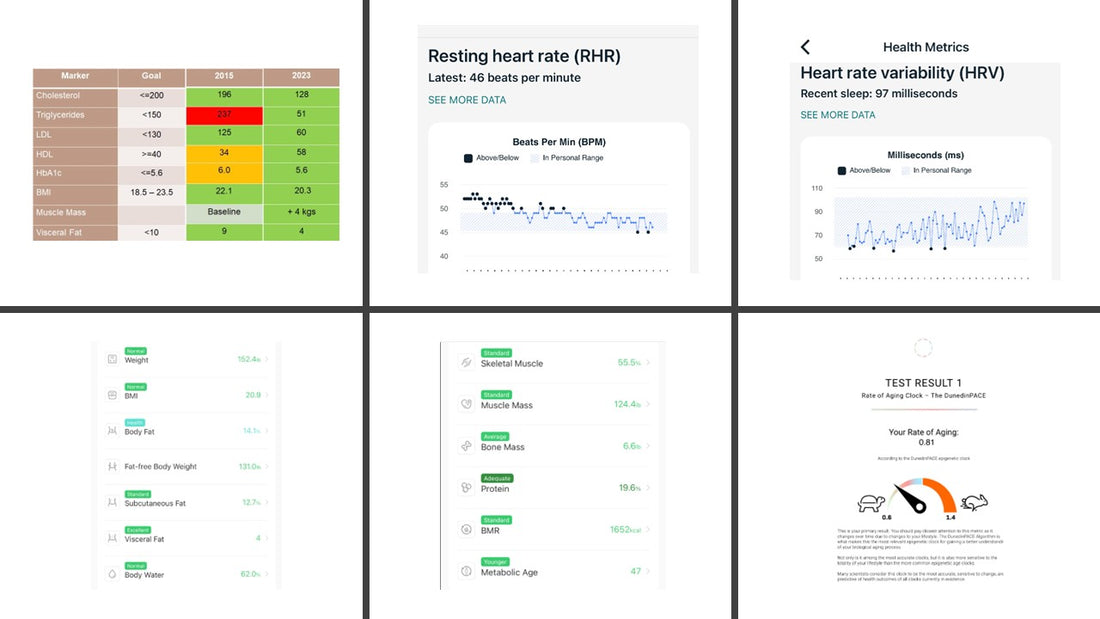It has been 8 years since I was diagnosed with Heart Disease (Coronary Artery Disease). My blood tests were mostly normal and there were no real red flags. And yet, there I was: at the 98th percentile of calcification of my arteries for my age.
Once I was over the initial shock, I realized I was actually incredibly lucky. Cardiovascular disease accounts for more deaths (32%) than the next 4 biggest causes of death combined (all the cancers, respiratory disease, diabetes and dementia). According to Stanford Health, among South Asians, heart attacks are happening earlier (25% of heart attacks occur under age 40, and 50% occur under age 50) and with higher mortality rates (there is a 40% higher chance of mortality from heart attacks among South Asians than the average population).
It led to me making a lot of changes to my lifestyle (food, exercise, sleep) in ways that did not require me to give up eating and doing all the things I love. To ensure my changes were medically, scientifically and nutritionally sound, I worked very closely with a number of amazing clinicians, dietitians and exercise trainers.
I am sharing a few of the improvements I have seen in my health parameters through this journey to demonstrate how effective these changes have been while being quite simple to implement. Moving forward, I will share my learnings and observations on these interventions through my GeneClinicX Instagram account and on my LinkedIn account, that I hope can help those of you that are looking for sustainable and fun ways to stay or become healthy. Your feedback and questions are very welcome!


82 comments
Vijay Chattha: This is an important topic to share. Congrats on the results. Are you taking a statin? And if so, has it helped?
Nickhil Jakatdar: Thanks Vijay! I have been on 20 mg of statin to stabilize the plaque that built up 8 years ago. As expected, over the first 3 months, I saw an initial 30% drop in LDL levels and triglycerides but then it stabilized at that level until I started my lifestyle interventions. Since then my triglycerides have dropped another 50% and my LDL has dropped another 20%. All my other markers that are not impacted by statins have improved significantly as well, including my HbA1c which typically goes up with the statin that I take.
Vijay Chattha: That’s great to hear and inspiring!
Matthew Hymes: Congrats on this amazing achievement in your health! There are a variety of markers available to measure stress like cortisol, as well as others to measure oxidative stress. I am aware of at least one company developing an OTC test that would allow regular monitoring of these at home. Happy to connect and discuss.
Nickhil Jakatdar: Matthew thank you. Hope you have been well. This area would be very helpful to learn more about. Anything you can share with me offline? Once I read it I would love to discuss further.
Vinay Joshi: While my son was working on some startup ideas in his psychiatry major, I was helping him (since I am a data person). We looked at a few healthcare startups using fairly simple wearables to measure HRV (Heart Rate Variability), resting heart rates and EDA (Electro dermal activity) to measure stress / anxiety levels. Apparently there is a ton of research which links this to cortisol measurements, well being and psychiatric disorder levels as well. There seems to be a deep connection between mental wellness and bodily functions. Might be worth another startup idea for your already long list of successes 😊
Nickhil Jakatdar: Vinay that’s fascinating to know. A good topic to chat about when we meet next. So much to learn…this space is ripe for data disruption.
Prasanna Deshpande: Wow! Congratulations Nickhil Jakatdar for achieving the fitness goals and being consistent about it. In general I see lot of confusion around the real “normal” levels of LDL and triglycerides, and lot of (positive and not-so-positive) opinions about consuming statins. It seems you have figured out the confusion. Anything you can share about it?
Nickhil Jakatdar: Prasanna very important questions and good points. Happy to talk about this on one of my seminars and I’ll try and cover it on an upcoming post. At a high level there are key blood parameters that should be part of the panel but aren’t. On top of that the issue about optimal ranges also exists. For statins that’s almost a philosophical conversation but I have a viewpoint I will share in a separate forum. Hope you can attend the next seminar.
Prasanna Deshpande: 100%. Count me in.
Anuj Dua: Nickhil – congratulations again on the amazing results. There’s theory and then there’s practice. When you bring them together to deliver results that are most consequential, like this – that’s beautiful, and inspiring. And that you’re helping others – like me – transform our lives in such a meaningful way, is service of the highest order. Thank you. Resharing reflections from my own journey to emphasize how your results are not one-off. https://medium.com/@anujrdua/hacking-my-way-to-better-health-cae46a39f049 Continue to spread the wealth my friend. We are all witnesses… and beneficiaries!
Nickhil Jakatdar: Anuj thank you for believing and committing to this journey and to Priya for supporting you through it with patience and grace. You helped validate for me that if this program is well designed then the onus on being very disciplined is lower. That is the biggest intimidation factor for most such programs. Your blog post is worth reading for anyone who thinks this is impossible to do.